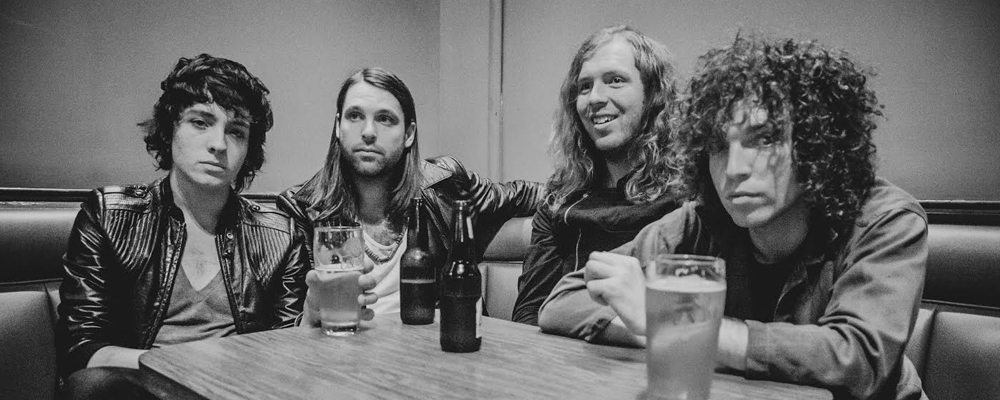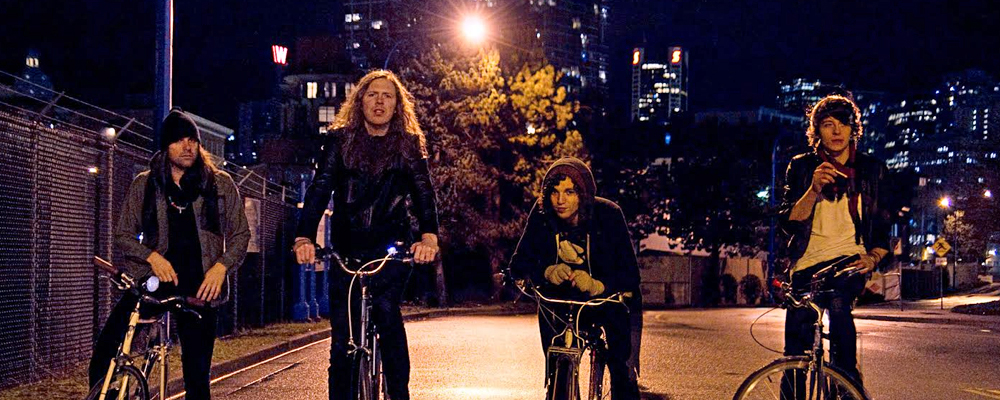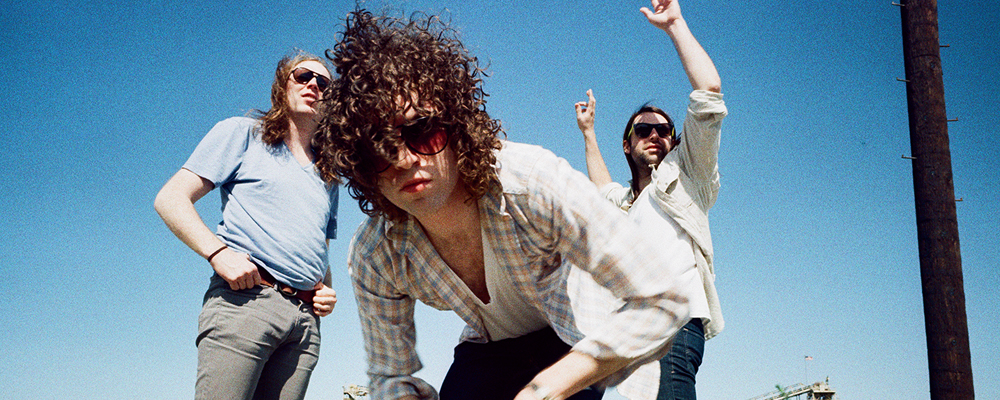Steve Bays of Hot Hot Heat Opens up About the Band’s Last Album and Going out With a Bang
Matt Matasci
Canadian art-rock band Hot Hot Heat burst onto the indie scene back in the early ‘00s with the release of buzzy single “Bandages” from their sub pop debut “Make Up the Breakdown.” The band quickly signed with major label Sire Records to release “Elevator” and “Happiness Ltd.,” two albums that were well-received but failed to make a major label impact on the modern rock scene. “Future Breeds” came in ‘10 and after six years without a release, the band’s self-titled fifth studio album is set to be released. The caveat from the band when the album was announced: it would be the final release from Hot Hot Heat. A step away from the experimental path, the band went on with “Future Breeds” and in many ways “Hot Hot Heat” channels the pure energy and excitement from their earlier dance-punk era. Just days before the release of the album, singer and guitarist Steve Bays spoke with Entertainment Voice about the long creative process behind the album.
The songs were written a few years ago – from ‘11 to ‘14. Did you know at the time of writing them that these would be the final batch of Hot Hot Heat songs?
It wasn’t a conscious thing at the time but there definitely was a sense of “getting the gang back together.” In contrast to how we used to be where we were either on tour or we would get home from tour and we were all living together and hanging out together 24/7 . . ., there was definitely a feeling of contrast in the air at that point for sure.
Did that affect the creative process compared to previous records?
Well, we kind of made the record twice. The first time we made it, we were kind of doing it in a style that is similar to how a lot of bands are making records these days – programmed beats, a lot of software, synthesizers, plug-ins . . . just trying to make it a more computerized album. That way is really good for writing and arranging because you can change the tempo at a moment’s notice. You can be like okay let’s take those chords and change the beat or let’s see what this song would sound like if it was in E# instead of B or whatever. You can just slide things around.
Originally it was going to be a very modern-sounding album and more of a dance album, I’d say. But it just didn’t feel like a Hot Hot Heat record. We loved the songs and doing it that way in my studio . . . we loved the comfort of doing it in my studio. But it just didn’t feel . . . we weren’t overly inspired to release it at that point. So we all just went our separate ways and along the way, I started a side-project called Mounties. We recorded and wrote a record as a live band in two weeks at this bigger studio down the hall from my studio. And that was such an inspiring record for me. I went to the guys and said, “Why don’t we take these songs that we’ve written but haven’t quite solved the riddle of and just reinterpret them as a live rock band?” Think of it as us just old school Hot Hot Heat playing to a club on the road and just record ourselves live.
I brought my Mounties bandmate Ryan in and he co-produced it with me because we had just finished doing the Mounties record and it was fresh in our heads. So it was the same gear, same studio down the hall from where my studio is, and we brought all the songs back into his room for overdubs and back into my room for mixing. It was a really simple, easy thing, which is kind of how it was for the Hot Hot Heat in the past. It was never like a contrived studio band, and I’m not opposed to the whole contrived studio approach, there are lots of bands that take the cut, copy and paste approach that I love, like Phoenix. But the Hot Hot Heat sound is more just a meat and potatoes live rock band.
What played into the decision to move on from Hot Hot Heat?
Part of it was that it seemed like the writing was on the wall at a personal level. We were all just going in different directions. I’ve never been inspired by the business of being in a band; it’s always been about the songs and about the live performances, the friendships and just being a gang. When it just didn’t feel like it was a natural thing and it started to feel like . . . if we keep going it’s going to be more for the fact that it’s becoming a job. As soon as that entered my mind, I just didn’t want to do it anymore. I’d only want to do it if it was a legitimate, obvious, natural thing. I definitely think we could have easily done another record but this record felt really good to me and it just felt like an exciting way to go out with a bang rather than a whimper.
Kind of like a bookend to your career . . .
Yeah and there’s so many bands that kind of end after a couple records that were just kind of a limp to the finish line. (laughs) Whereas this one, we really put a lot into making this album. And by “a lot” I mean we wrote a ton of different songs and we tried to cover different approaches. The actual writing of a song comes pretty quickly and easily but how it fits into the band’s aesthetic or if it represents the kind of music you’re into at that time, that’s where there can be a lot more time put in. There are a thousand different ways you can play the same song.
How did you narrow down the songs you had written to the 10 that were recorded for the final Hot Hot Heat album?
If the goal wasn’t to have a unanimous decision, then this album could have definitely been 30 songs, easily. I think we just chose the 10 that were unanimously supported. It was actually more like nine songs, to be honest, the last one on the record (“The Memory is Here”) was just an improvisation at the very end of the last day of recording and it’s just kind of like a one-take idea that was documented while we were jamming and Ryan, who was engineering it even though I mixed the other nine songs, mixed that one in his room and just kind of presented it to me and said, “Hey I don’t know if you remember doing this but check out this little moment.”
I feel like a lot of the record is about coming to grips and being okay with the fact that as life goes on people come and go in your lives; you might have friendships and even within the band, we spent every day together for so many years and just accepting that we’re all moving in different directions. Still having love for them and thinking about it positively, not like a sad thing. Hot Hot Heat has always been about trying to find the optimism and positivity while being fully aware of the darker side of the world.
As you mentioned earlier, you brought on Ryan Dahle to co-produce this self-titled album. Was it important for you to work with someone familiar on this record?
I built my studio and taught myself how to record in ‘08 after we had put out “Happiness Ltd.” in ‘07. The process of making “Happiness Ltd.” was kind of an uphill battle for me because we made the album the same way we made “Make Up the Breakdown,” which was that we recorded it at Mushroom Studios in Vancouver really quickly and we did it with one producer who was Butch Walker and just made the album kind of punk rock the way we wanted to. But then, unlike in the past . . . and at this point, Warner Brothers had changed a lot and there were all these new people working there . . . they wanted it to sound more radio-friendly. So we had to drop a bunch of songs that I thought were really cool and different and then record with some different producers. It just didn’t rub me the right way even though I loved that record in the end. It was just a lot more difficult than it had to be.
So that’s when I taught myself to record and I did “Future Breeds” but by the time I was done recording “Future Breeds” I was so burnt out on that record! I ran into Ryan Dahle one day and struck up a conversation with him before I ever really knew much about him. I said, “I like your energy, why don’t you mix ‘Future Breeds’?” He said he wasn’t really a dedicated mixer and more of an engineer, but I said let’s just take a chance on it. We spent eight months mixing that album and finishing it, fixing all the mistakes that I had put into the album as an amateur engineer. It was just such a great bonding experience and it was around that time that I realized that the process of making the record is the reward for me. So it needs to be an enjoyable thing.
Being allowed to make records and knowing that there’s at least a small fanbase of people who want to hear them is such a beautiful luxury and that is the reward – making music that people might actually [want to] hear. But since then, I’ve produced a bunch of records for other bands, mixed a bunch of records for people and co-written with a bunch of other people but for the most part I try to keep it in the family; just work with people [who] I think have good values and are good people in it for the right reasons, not just to make a bunch of money and cash out. You don’t always get that . . . sometimes you start making a record with someone and you think it’s going to connect and then you end up not connecting. You think they’re in it for the music but turns out they are just wanting to be famous. There are all sorts of interesting motives for why people make records, but I like working with Ryan because I think he’s just a genuine fan of creating music and I felt comfortable with and trusted his motives.
Are there any plans to tour behind the album?
Not sure yet. Maybe yes, maybe no. (laughs)
With Hot Hot Heat coming to a close, what is next for you?
Personally, I am going to keep making my own records and I’ve got another Fur Trade record that’s almost done and I’m working on kind of two more Mounties records at the same time. Then I’ve got collaborations [I’m] coming out with . . . . I’ve been co-writing with a lot of different people like Fitz and the Tantrums; I did something with Diplo; I did stuff with Born Ruffians; The Matinee and Hawksley Workman. I just mixed the Gay Nineties’ record and I finished mixing The Zolas and We Are The City. I’ve been doing a lot of mixing and I kind of like all stages.
My philosophy is that if someone wants me to be the engineer, I’ll do that. If someone wants me to be a co-writer, I’ll do that. I basically just wake up every day and go to my studio and there’s always a list of about 10 things I could work on that day . . . . The thing with Hot Hot Heat was, and I’m super grateful that we got to this stage, it put out a record and it was kind of assumed that it’s going to be promoted for a couple years; we go tour around the world and it’s just a lot of time and energy devoted toward promoting the band, and I love making records and being creative but the whole promotion aspect does not come naturally to me. I can work anyone under the table in the studio but as soon as I get on a tour bus I start whining. (laughs)
I feel like I have so many more records in me and the older I get the more liberated I feel creatively. I am just excited to explore that. I don’t really think in terms of success, unfortunately to the detriment of the labels and management that want to invest their time and money in me. I want to try to stay motivated about music. It’s a different journey for everyone. I think with some bands they are really motivated by the business of it all, whereas unfortunately, I am not. But I am motivated by the record-making process, so I’ll keep focusing on that.
“Hot Hot Heat” is available June 24 on Apple Music.




